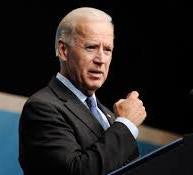 Vice President Joe Biden commended the “courage” of older students returning to complete or advance their degrees at community college and other institutions of higher education.
Vice President Joe Biden commended the “courage” of older students returning to complete or advance their degrees at community college and other institutions of higher education.Vice President Joe Biden announced the recipients of $450 million in grants designed to help community colleges and other institutions of higher education provide better job training for students. The grants will go to almost 270 higher education institutions, and are intended to provide funding for partnerships with employers in industries like information technology, health care, energy and advanced manufacturing.
The announcement was made in a televised hearing Monday morning.
“This is not some kind of gift. This is an investment in school leaders, in businesses, in people who are trying to do things in a very, very different way,” said Secretary of Education Arne Duncan. “I’ve been to dozens and dozens of community colleges, and they are some of the most inspiring visits that I have, anywhere I go.”
The grants the different institutions were awarded varied widely. Among the hundreds of institutions, Massasoit Community College, in Brockton, Massachusetts, was given $20 million. Virginia State University in Petersburg, Virginia, received over $3 million.
Funding for the grants come from the Trade Adjustment Assistance Community College and Career Training (TAACCCT) competitive grant program. The Department of Labor and the Department of Education co-administer the program.
“The joint venture that the Department of Education and the Department of Labor have is indeed a joint venture, because, for so many people, the K-12 system is already in the rear view mirror and the challenge for us to make sure that the jobs of the 21st century are accessible to all of them,” said Secretary of Labor Thomas E. Perez.
Community colleges, Perez said, are at the forefront of innovation and partnership in creating a new educational model for the 21st century. The goal of the grants is to help institutions provide the tools for students to enter the middle class.
Secretary Perez noted that institutions of higher education are moving away from a “train and pray” paradigm, where colleges and universities would “train” their students and then “pray” that there were jobs. Instead, the new educational model is driven by job demand.
Perez identified green energy, health care and information technology as some of the emerging industries that need skilled workers and provide a pathway to the middle class.
Tailoring educational programs to needs in the job market benefits students and employers, according to Perez. “We need that steady pipeline of skilled workers,” he said. “And that’s what the TAACCCT program has been about.”
“What we are in the middle of, my friends, is an unmistakable revolution and transformation of how we are educating our people to compete for the jobs of the 21st century, and punch their ticket to the middle class,” said Perez.
According to Duncan, not only do community colleges serve diverse student bodies, but they also are becoming the “economic engines” of their communities. “Businesses are coming to those communities, because of the real training college is providing to help real people get real jobs,” he said.
Duncan said that students at community colleges represent a wide array of ethnic backgrounds and ages. Some, he noted, are returning to school after years in the workforce.
Biden commended the “courage” of older students returning to complete or advance their degrees at community college and other institutions of higher education. “You see women and men, coming back to school, taking a chance,” he said. “And the chance they’re taking is their pride. They’ve been out of school five, 10, 15 years. They want to provide for their families, and their going back into an education circumstance, an institution that maybe they didn’t do very well in, five, 10, 20 years ago.”





















